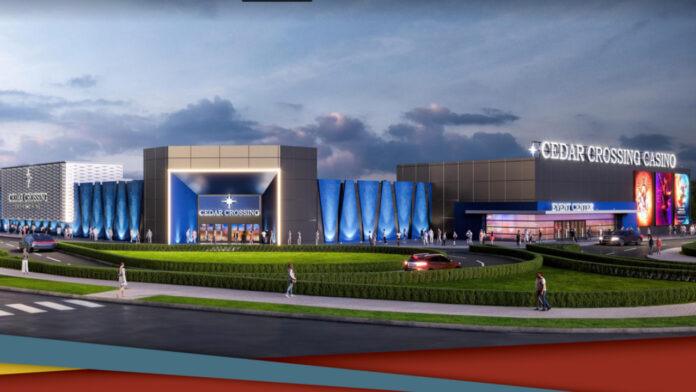
A Des Moines-based group has launched a campaign against the effort to obtain a gaming license for a Cedar Rapids casino.
Iowans for Common Sense, which bills itself as “a grassroots coalition dedicated to preserving the integrity of Iowa’s communities,” issued a news release Tuesday, Nov. 12, calling on area residents to stand against the push for a new casino in Cedar Rapids.
“The message from Iowans is clear,” Iowans for Common Sense spokesperson Zachary Harnden said in the release. “People across the state value what our current casinos bring to their communities but do not support further expansion. Cedar Rapids residents, in particular, are firmly opposed, and we’re here to support them in amplifying their voices.”
The release also points to a YouTube video, and a petition campaign calling for a moratorium on new casinos in Iowa, at the Iowans for Common Sense website.
According to the release, a study conducted by UpONE Insights, an Arlington, Virginia-based polling and research firm, indicates that while a majority of Iowans are in favor of casino gambling in the state overall, two-thirds of Iowa residents oppose new casinos, and 53% of Cedar Rapids residents are against the proposed new casino in Cedar Rapids.
The study, which UpONE indicates is based on a random telephone survey of 500 Iowa residents in September, also asserts that 56% of voters across Iowa support a moratorium on further casino expansion.
Jonathan Swain, president of the Cedar Rapids Development Group, which is pursuing a casino license from the Iowa Racing and Gaming Commission, reacted strongly to the study and the motivations of the group behind it.
“The Iowans for Common Sense poll is not a credible reflection of public opinion – it was conducted not by a grassroots organization, but coordinated by an individual with personal ties to one of the state’s leading competitors,” Mr. Swain said, referring to the Riverside Casino and Elite Casino Resorts CEO Dan Kehl.
“This poll appears to be a thinly veiled attempt from a group more interested in eliminating potential competition than amplifying the voices of Linn County residents,” Mr. Swain said.
Cedar Rapids residents have twice voted on a referendum supporting casino gaming in Linn County, most recently in 2021, and as a result of that vote, supporters will not have to return to county voters for another referendum.
“Cedar Crossing Casino and Entertainment Center enjoys strong, long-standing community support,” Mr. Swain said. “With two separate voter referendums in 2013 and 2021, the people of Cedar Rapids have made it clear they want this development. The project also has widespread support from local government officials and community organizations, including endorsements from the City of Cedar Rapids, Linn County, and other community leaders. Any claim that suggests otherwise is uninformed and misleading.”
Stephanie Sexton, president of the Washington County Riverboat Foundation, the agency charged with distributing a portion of Riverside Casino proceeds to area nonprofit agencies, said the foundation has distributed nearly $70 million to nonprofits and municipalities in southeast Iowa.
“To see the uplift and the reach that those casino gaming dollars have had in all of Southeast Iowa, both In urban centers and the rural landscape, is just dramatic,” said Ms. Sexton.
Those contributions, as well as direct donations from the casino’s Giving Back program to groups such as HACAP of Washington County, the North Liberty Community Pantry and the Freedom Foundation veteran’s food pantry in Cedar Rapids, could be significantly curtailed by the addition of a new casino, which could cut into Riverside Casino’s overall proceeds, Ms. Sexton said.
“We don’t want to dilute the amount of gaming revenue that’s available for southeast Iowa nonprofits,” Ms. Sexton said.
The Riverside Casino, she said, is a “vital pillar” of the community.
“Time and time again, they have demonstrated responsible gaming and economic and social responsibility,” she said, “and I think we should prioritize the folks that have already proven their merit. I think we really need to ask again, what’s the percent of projected adjusted gross revenue that would be diluted from the existing Iowa operators if this proposed (Linn County) casino went through?”
A separate market study released in September, commissioned by Peninsula Pacific Entertainment (P2E), the proposed developer of Cedar Crossing, and conducted by Convergence Strategy Group (CSG) of New Orleans, claims that a new Cedar Rapids casino would provide $80.2 million in new gaming revenue in Iowa – more than the $51 million in new projected revenue from the IRGC’s 2021 market study.
According to P2E, Cedar Crossing would support 524 full-time jobs and draw more than a million visitors to Cedar Rapids annually.
Two more market studies commissioned by the IRGC are slated to be reviewed at the commission’s January meeting.
Ms. Sexton clarified that while the Washington County Riverboat Association supports the Iowans for Common Sense group’s efforts, the two groups aren’t officially affiliated.
While acknowledging that Cedar Rapids could benefit from a new casino, she felt it wasn’t needed in a state that already has 19 state-licensed casinos and four others operated by Native American tribes.
“There are other potential avenues that might be available to Cedar Rapidians that might not be available to the rural landscape here in southeast Iowa,” she said. “There might be other avenues that those folks can tap into, that other folks don’t have that opportunity. We have approved grants not just in Washington County, but in Johnson County and Cedar County. And you know, as we move south of us, there’s a lot of money that’s been funneled into those nonprofits, not just in our county. I don’t know if that would be reciprocated.”
“Our commitment extends far beyond gaming,” Mr. Swain responded. “We’re dedicated to fostering economic growth and supporting community development through our proposal, which includes an 8% charitable contribution to our Qualified Sponsoring Organization. This contribution percentage is the highest in the state and is projected to equate to more than $6 million annually, providing a significant boost to local nonprofits and community initiatives in Linn and surrounding counties. Cedar Crossing is an entertainment project that will drive growth and long-term success for the community – a partnership with the city and county that promises a better future fitting for the residents who have clearly stated their support.”
The IRGC has twice rejected casino proposals for Linn County, in 2014 and 2017, after commissioners largely sided with opponents who argued the state’s gaming market was saturated and a new Linn County casino would substantially “cannibalize” revenue from existing state-licensed casinos.
But all five members of the IRGC are newly-appointed since the last decision, raising supporters’ hopes of receiving a license.
The IRGC will meet in Cedar Rapids Nov. 20 for a site visit and to host a question-and-answer session at the Hotel at Kirkwood Center for members of the public regarding the proposal. The meeting will start at 10 a.m. A speaker registration period will precede the meeting. Individuals who wish to speak at the meeting must register between 8 a.m. and 10 a.m., before the meeting begins.
The two IRGC-commissioned gaming market studies are due by the end of December, and the commission is slated to vote in a special meeting Feb. 6, 2025 whether to approve or reject the Linn County gaming license application.




